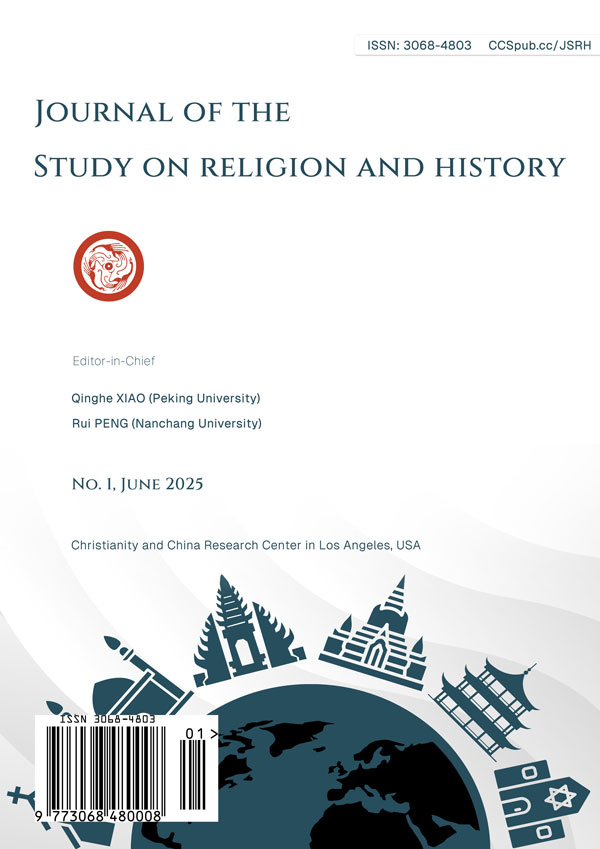Published 2025-07-02
Keywords
- Augustine, virtue, Cicero, love, happiness

This work is licensed under a Creative Commons Attribution-NonCommercial-NoDerivatives 4.0 International License.
How to Cite
Share
Abstract
The paper investigates whether Augustine adheres to the Stoic assertion that “virtue is self-sufficient for happiness,” especially whether Augustine still maintains the self-sufficiency of virtue in this imperfect life. This paper will first present how Augustine adopts the self-sufficiency of virtue in his earlier writings. After that, this paper will show how Augustine criticizes the self-sufficiency of virtue in this life by emphasizing original sin. Lastly, this paper argues that Augustine redefines virtue by introducing the concept of love, through which he redefines the cardinal virtues and theological virtues. Grounded in the idea of love, Augustine contends that properly ordered love can contribute to happiness in this life. In a word, virtue is also self-sufficient in this life, but only when received as love from God.
Counts
Views: 221 / Downloads: 74Downloads
References
- Augustine. 1990. Letters 100-155.Translated by Roland Teske. New York: New City Press.
- Augustine. 2002. On the Trinity. Edited by Gareth B. Matthews. Translated by Stephen McKenna. Cambridge Texts in the History of Philosophy. Cambridge: Cambridge University Press.
- Augustine. 2009. On The Happy Life. Translated by Michael Foley. New Heaven & London: Yale University Press.
- Beierwaltes, Werner. 1980. Regio beatitudinis in The Saint Augustine Lecture Series: 7-77.
- Bochet, Isabelle. 2018. Habitus According to Augustine: Philosophical Tradition and Biblical Exegesis. In The Ontology, Psychology and Axiology of Habits (Habitus) in Medieval Philosophy. Edited by Nicolas Faucher and Magali Roques. Switzerland: Springer, pp.47-66.
- Boersma, Gerald. 2017. Augustine's immanent critique of Stoicism in Scottish Journal of Theology, 70:2, pp. 184 – 197.
- Byers, Sarah. 2012. Perception, Sensibility, and Moral Motivation in Augustine. A Stoic-Platonic Synthesis. Cambridge: Cambridge University Press.
- Brown, Peter. 2000. Augustine of Hippo: A Biography. California: University of California Press.
- Cicero. 1990. Tusculan Disputations II & V. Translated by A. E. Douglas. Warminster: Aris & Phillips.
- Cohoe, Caleb.2020. What Does the Happy Life Require? Augustine on What the Summum Bonum includes. In Oxford Studies in Medieval Philosophy 8:1-41.
- Colish, Marcia.1985. The Stoic Tradition From Antiquity To The Early Middle Ages: II. Stoicisim in Classical Latin Literature. Leiden:Brill.
- Flasch, K. (1990). Logik des Schreckens. Augustinus von Hippo: De diversis quaestionibus ad Simplicianum I 2. 2nd ed. Mainz: Dieterich.
- Frede, Michael. 2011. A Free Will. Origins of the Notion in Ancient Thought. California: University of California Press.
- Harding, Brain. 2008. Augustine and Roman Virtue. London: Bloomsbury Publishing.
- Horn, Christoph. 1998. Antike Lebenskunst: Glück und Moral von Sokrates bis zu den Neuplatonikern. München: C.H. Beck.
- Horn, Christoph. 1999. Augustinus über Tugend, Moralität und das höchste Gut. In Zur Rezeption der hellenistischen Philosophie in der Spätantike. Edited by T. Fuhrer and M. Erler. Stuttgart: Teubner, pp.173–90.
- Karamanolis, George. 2020.The Primacy of Virtue. The Transition from De finibus to Tusculanae Disputationes 5. IN Cicero ethicus Die Tusculanae disputationes im Vergleich mit De finibus bonorum et malorum. Edited by Gernot Michael Müller and Jörn Müller. Heidelberg: Universitätsverlag Winter, pp.149-171.
- O’ Donovan, Oliver.1980. The Problem of Self-Love in St. Augustine. Yale: Yale University Press.
- Ogle, Veronica Roberts. 2019. Therapeutic Deception: Cicero and Augustine on the Myth of Philosophic Happiness. In Augustinian Studies, 50 (1): 13-42.
- Rist, John. 1994. Ancient thought baptized. Cambridge: Cambridge University Press.
- Torchia, J. 1990. The Significance of the Moral Concept of Virtue in St. Augustine’s Ethics in Modern Schoolman 68 (1):1-17.
- Tornau, C. 2005. Eros versus Agape? Von Plotins Eros zum Liebesbegriff Augustins. In Philosophisches Jahrbuch 112.2: 271-291.
- Tornau, C. 2015. Happiness in this life? Augustine on the Principle that Virtue Is Self- sufficient for Happiness. In The quest for the good life: Ancient philosophers on happiness. edited by Øyvind Rabbås, 265-280. Oxford: Oxford University Press, pp. 265-292.
- Riel, V. G. 2007. Augustine’s Will, an Aristotelian Notion? On the Antecedents of Augustine’s Doctrine of the Will, in Augustinian Studies 38:1: 255-279.
- Wetzel, J. 1992. Augustine and the Limits of Virtue, Cambridge: Cambridge University Press.
- Wolterstorff, Nicholas. 2012. Augustine’s rejection of eudaimonism, In Augustine’s City of God: A Critical Guide. Edited by James Wetzel. Cambridge: Cambridge University Press, pp. 149-166.

